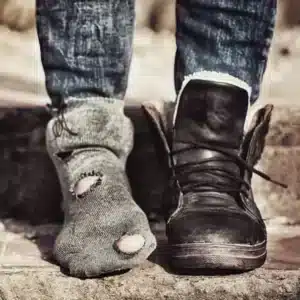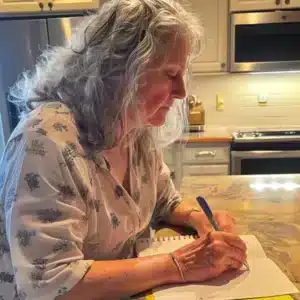He began to feed the dog from his plate, but I soon realized what was truly happening.
The day my grandfather moved in with us was the beginning of it. We had turned the den into a bedroom for him, placed a recliner by the window, and piled his Louis L’Amour books and old photo albums on the bookshelf. He shuffled around the house with the slow, cautious steps of someone who didn’t completely trust the ground beneath him and didn’t say much during the first week.
Two months ago, he suffered a minor stroke, and according to his doctor, routine is now crucial. Along with engagement, that is. Continue to stimulate him. Speak with him. Add him.
It was more difficult than I had anticipated.
In the first place, Grandpa Roman was not a big talker. He was an old-fashioned man who, simply for the sake of holding something in his hands, would whittle bits of wood into nothing. After working as a mechanic, he owned a hardware store before retiring as a widower and spending most of his time watching Westerns at an excessively high volume.
It was more difficult than I had anticipated.
In the first place, Grandpa Roman was not a big talker. He was an old-fashioned man who, simply for the sake of holding something in his hands, would whittle bits of wood into nothing. After working as a mechanic, he owned a hardware store before retiring as a widower and spending most of his time watching Westerns at an excessively high volume.
We were all caught off guard when he and Rizzo began to bond.
Our big, shaggy Bernese mix, Rizzo, had the ability to make grown men cross the street. Grandpa, however, saw him as a kind giant. A week later, Rizzo was curled up like some giant guardian angel at the foot of Grandpa’s recliner.
Before long, Rizzo began to follow him everywhere. And I mean everywhere, including restroom breaks. Rizzo would use his nose to nuzzle Grandpa’s cane back toward him if he dropped it. Rizzo would bark until someone came to check on Grandpa if he took too long to get out of bed.
It seemed sweet to us. We reasoned that perhaps Grandpa had found a reason to continue.
Then the eggs appeared.
Grandpa would always sneak into the kitchen before anyone else was awake on Sundays and begin preparing scrambled eggs. Even though he had trouble keeping the spatula steady, he always managed. And he would always serve Rizzo the first few bites—straight from his plate—without fail.
I thought it was cute once. Like old friends, a man and his dog are eating breakfast together.
Until one morning I heard him.
Earlier than usual, in fact. I paused in the hallway on my way to the kitchen for coffee. I overheard Grandpa conversing. He was whispering, not mumbling, as if he were confiding in someone.
It’s a beautiful custom, isn’t it? On Sundays, eggs are always made.
I stood motionless, forgetting the ceramic mug I was holding.
Hazel, my grandmother, passed away two years ago. Every Sunday, she was the one who prepared his eggs. Before serving them to him with toast and jam, she would get up early and whip them with milk and a pinch of pepper. He didn’t make them himself. In sixty years of marriage, not once.
Nevertheless, here he was. Creating them. Speaking with Rizzo.
I had never experienced the sting of something more profound before. I hoped it was only a recollection. Perhaps he was reminded of her by the eggs. Perhaps he simply enjoyed the ease of pretending.
However, it didn’t end there.
When he believed no one could hear, he began referring to Rizzo as “Hazie.” He started using one of Grandma’s old hairbrushes to brush Rizzo’s thick fur. One day, I discovered a pair of her earrings next to a dog treat on the nightstand.
I was at a loss for what to do.
My mother just looked worn out when I brought it up to her. “Let it if it makes him feel better,” she said. “No one is being harmed by him.”
However, it seemed as though a boundary had been crossed. As if something delicate within him were shattering, and nobody dared to acknowledge it.
The night that everything changed then arrived.
A thunderstorm had rolled in, and it was late. Rizzo had always detested storms. Usually, he would pace or hide beneath the couch until it was over. However, he remained by Grandpa’s side that night, motionless, his gaze fixed on him as if he knew something we didn’t.
I heard a bark at about two in the morning.
Grandpa was unconscious on the floor with blood on his forehead when I hurried downstairs. He had stumbled when he attempted to stand up to close the window. The entire house had been awakened by Rizzo’s loud bark.
If Rizzo hadn’t sounded the alarm, the paramedics said, he might have lay there for hours.
Grandpa held my hand more tightly than ever that night at the hospital. “Hazie saved me… she saved me again,” he whispered repeatedly.
Then it dawned on me.
Confusion wasn’t the only thing.
It was affection.
Grandpa had rewired himself in some way to keep her near him. He had poured all of his memory, love, and devotion into the creature that never left his side while Grandma was away. It might not have been logical. It might not have been healthy. It was human, though.
Part psychological preservation, part nostalgia, the doctors dubbed it “reminiscence-based coping.” We all knew that Grandpa would not attend the cognitive therapy that they suggested. He had made his own rules in life. He had no intention of sitting on a couch and confiding in a stranger dressed in khakis.
Thus, we met him at his location.
We began leaving small items for him to discover. Aunt’s antique music box. One of her old scarves. My mom even began preparing eggs using his old Sunday recipe, which he secretly cherished but always insisted was “nothing special.”
What about Rizzo? He continued his usual behavior. He remained.
Grandpa and I sat on the back porch a month later. Long orange streaks were visible in the sky as the sun was lowering. With his hand resting on Rizzo’s head, he appeared at ease.
With his eyes on the horizon, Grandpa said quietly, “I know he’s not her.” “But sometimes… sometimes it seems like she responds when I speak to him.”
I simply nodded since I was at a loss for words.
“She would’ve liked you being the one to find out,” he continued, smiling slightly.
I blinked. “What do you mean?”
Grandpa looked in my direction. You see things, she would always say. Consider what’s behind it as well as what’s in front of you. underneath it. You know you have her eyes.
I remembered that moment.
It felt like a bridge—between the past and present, memory and love, grief and grace—not because it was profound or heart-stopping.
Grandpa continued to make Rizzo eggs. However, he also began to eat more. More laughter. Talking more.
Additionally, I occasionally caught him humming under his breath one of Grandma’s favorite songs.
I now share this story when people ask me how I can support someone going through a difficult time.
Because sadness doesn’t always manifest as silence or tears. At times, it resembles a dog named Rizzo and scrambled eggs.
Please share if this touched you. It’s also possible that someone you know is feeding a memory eggs.





